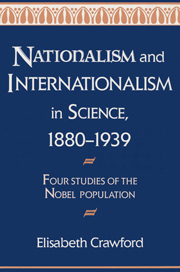Book contents
- Frontmatter
- Contents
- List of tables and figures
- Acknowledgment
- Introduction
- PART I CONCEPTUAL AND HISTORIOGRAPHICAL ISSUES
- PART II CRITICAL AND EMPIRICAL STUDIES
- 3 Internationalism in science as a casualty of World War I
- 4 Center-periphery relations in science: the case of Central Europe
- 5 National purpose and international symbols: the Kaiser-Wilhelm Society and the Nobel institution
- 6 Nobel laureates as an elite in American science
- Bibliographical essay
- Index
6 - Nobel laureates as an elite in American science
Published online by Cambridge University Press: 06 November 2009
- Frontmatter
- Contents
- List of tables and figures
- Acknowledgment
- Introduction
- PART I CONCEPTUAL AND HISTORIOGRAPHICAL ISSUES
- PART II CRITICAL AND EMPIRICAL STUDIES
- 3 Internationalism in science as a casualty of World War I
- 4 Center-periphery relations in science: the case of Central Europe
- 5 National purpose and international symbols: the Kaiser-Wilhelm Society and the Nobel institution
- 6 Nobel laureates as an elite in American science
- Bibliographical essay
- Index
Summary
It is tempting to view scientific development in terms of the inherent elitism of the enterprise, and, as we have seen in Chapter I, studies of scientific elites have constituted a nonnegligible strand of work in the social history of science. This for several reasons: First of all, the idea that scientists constitute a chosen few, who by virtue of superior ability and dedication to the task stand high in society, agrees more or less with the facts. Before World War II, there were indeed few practitioners of science and they were generally accorded high social status, although not always as high as at present. Second, scientists themselves believe that a certain amount of inegalitarianism is necessary to advance the enterprise, and some have not hesitated to express this. “There is no democracy in physics” is the oft-quoted statement of Luis Alvarez, Nobel laureate (Ph 1968). “We can't say that some second-rate guy has as much right to an opinion as Fermi.” Einstein elevated this communion of superior minds into a principle of universalism in science. “The supranational character of scientific concepts and language,” he wrote, “is due to the fact that they were formed by the greatest brains of all countries and all times.” Third, elitism has been rendered visible, and perpetuated, through the elaborate system honoring scientific achievement that has evolved over time.
- Type
- Chapter
- Information
- Nationalism and Internationalism in Science, 1880–1939Four Studies of the Nobel Population, pp. 125 - 146Publisher: Cambridge University PressPrint publication year: 1992

